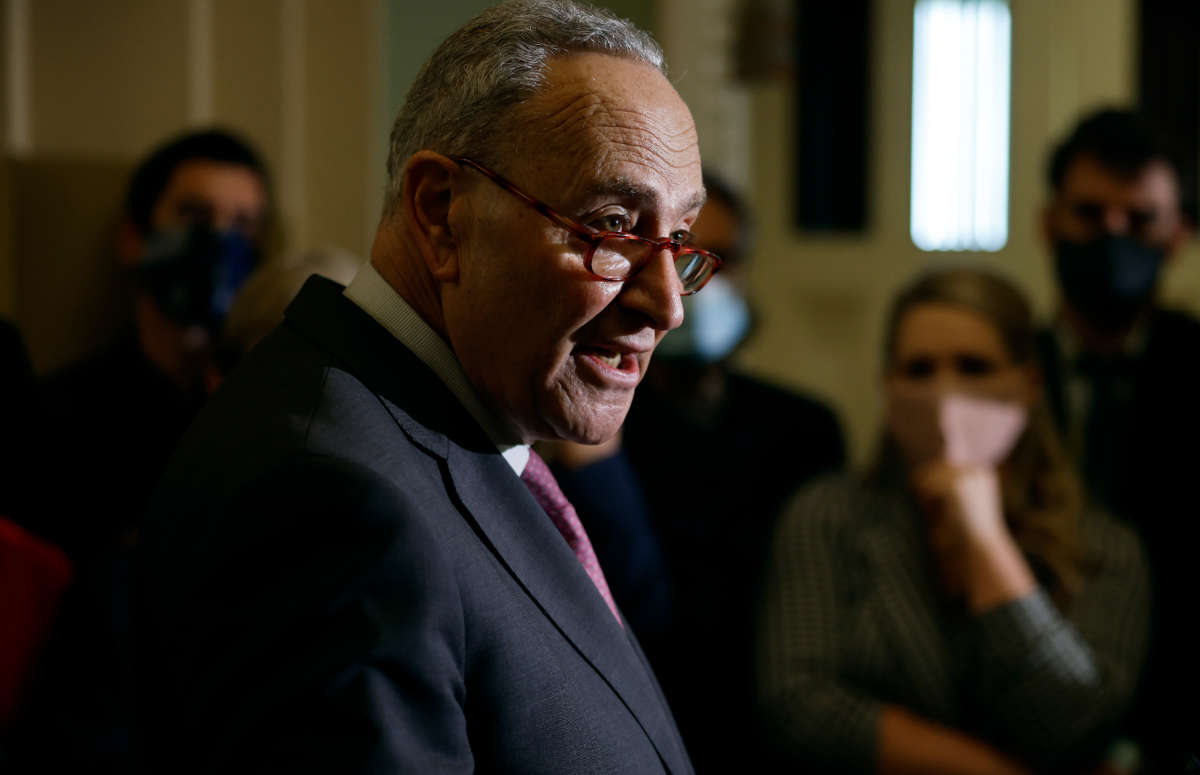Senate Majority Leader Chuck Schumer (D-New York) has promised to set up a vote on changing the filibuster later this month if Republicans in the Senate continue to block voting rights legislation.
This isn’t the first time Schumer has suggested changing filibuster rules as a means to subvert Republicans. In September, he hinted that Democrats could potentially change the filibuster rule after the For the People Act was blocked; a more moderate compromise bill offered by conservative Democrat Joe Manchin (West Virginia) was eventually blocked by a GOP filibuster too.
Schumer made a similar promise to change filibuster rules in early November, after Republicans blocked voting rights legislation for the fourth time in less than a year — that time, it was the John Lewis Voting Rights Advancement Act, which would have allowed federal oversight on state election laws to prevent racial discrimination at the ballot box.
This time, Schumer’s promise appears to hold more weight, as he’s selected a day for Democrats to vote on changing the filibuster.
In a “Dear Colleague” letter on January 3, Schumer wrote about the anniversary of the January 6 Capitol attack, noting that the U.S. had faced numerous threats to its democracy since the 2020 presidential election — including the onslaught of Republican-backed voter suppression bills across the country.
“Much like the violent insurrectionists who stormed the US Capitol nearly one year ago, Republican officials in states across the country have seized on the former president’s Big Lie about widespread voter fraud to enact anti-democratic legislation and seize control of typically non-partisan election administration functions,” Schumer wrote. “While these actions all proceed under the guise of so-called ‘election integrity,’ the true aim couldn’t be more clear. They want to unwind the progress of our Union, restrict access to the ballot, silence the voices of millions of voters, and undermine free and fair elections.”
Schumer vowed that the Senate would “take strong action to stop this antidemocratic march” by passing voting rights protection bills. But Democrats must change filibuster rules to prevent Republicans from blocking such legislation, he added.
“We must ask ourselves: if the right to vote is the cornerstone of our democracy, then how can we in good conscience allow for a situation in which the Republican Party can debate and pass voter suppression laws at the State level with only a simple majority vote, but not allow the United States Senate to do the same?” Schumer said.
The Senate “must evolve, like it has many times before,” to address the assault on democratic rights, Schumer went on. He said that a vote on changing the filibuster was scheduled for January 17 — Martin Luther King Jr. Day — “to protect the foundation of our democracy: free and fair elections.”
Of course, it will be difficult for Democrats to persuade Republicans to allow the passage of voting rights legislation or to vote for altering the filibuster — and several moderates in the Democratic caucus have also expressed opposition to such a move, most notably Senators Joe Manchin of West Virginia and Kyrsten Sinema of Arizona. However, other moderates in the caucus, including Angus King (I-Maine), Tim Kaine (D-Virginia) and Jon Tester (D-Montana), have been negotiating with Manchin and Sinema since before the holidays to discuss amending the filibuster rule. Possible amendments to the rule could include returning to a standing or talking filibuster in order to block legislation.
Schumer’s letter didn’t specify whether he wanted to make small changes to the filibuster or end the rule completely.
Polling from March of last year indicated that most Americans are in favor of ending the filibuster completely if it would enable the passage of meaningful voting rights protections. In a Data for Progress/Vox survey, 52 percent of respondents said they would support altering the archaic Senate rule if it meant the For the People Act would get passed, while only 37 percent said they would be against it.
Join us in defending the truth before it’s too late
The future of independent journalism is uncertain, and the consequences of losing it are too grave to ignore. To ensure Truthout remains safe, strong, and free, we need to raise $29,000 in the next 36 hours. Every dollar raised goes directly toward the costs of producing news you can trust.
Please give what you can — because by supporting us with a tax-deductible donation, you’re not just preserving a source of news, you’re helping to safeguard what’s left of our democracy.
